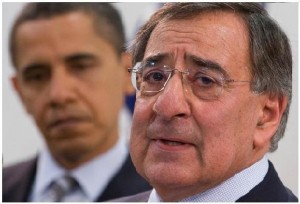Secretary of Defense Leon Panetta responds to a question about the legality of assassinating Anwar al-Awlaki:
This individual was clearly a terrorist. And yes, he was a citizen, but if you’re a terrorist, you’re a terrorist. And that means that we have the ability to go after those who would threaten to attack the United States and kill Americans. There’s no question that the authority and the ability to go after a terrorist is there.
Usage guru Bryan A. Garner writes of the word “clearly,”
Exaggerators like this word, along with its cousins (obviously, undeniably, undoubtedly, and the like). Often a statement prefaced with one of these words is exceedingly dubious. (The Oxford Dictionary of American Usage and Style, Oxford University Press, 2000.)
Indeed, take a look at “Anwar al-Awlaki’s Suspected Ties to Terror Plots.” Notice that in only one of the eight plots is there any mention of al-Awlaki’s participation; all the others involve “inspiration” or religious instruction, often of people al-Awlaki never met. But let’s not dwell too much on details. Leon Panetta doesn’t. He follows his “clearly” statement with a tautology (“if you’re a terrorist, you’re a terrorist”). Then comes an equivocation about the administration’s “ability” to do what it did. If Panetta means the physical or mental power to perform the act, then this is self-evidently correct and irrelevant. If he means the legal authority, then he has, in the words of The Oxford Dictionary of Philosophy, “assum[ed] what is at issue in an argument,” or begged the question (yes, that phrase actually means something). He wraps up with a wordier version of undeniably (“there’s no question”), makes the preceding equivocation plain by distinguishing “authority” from “ability,” and again begs the question.
Panetta was once a practicing lawyer. I see now why he prefers extrajudicial methods.



